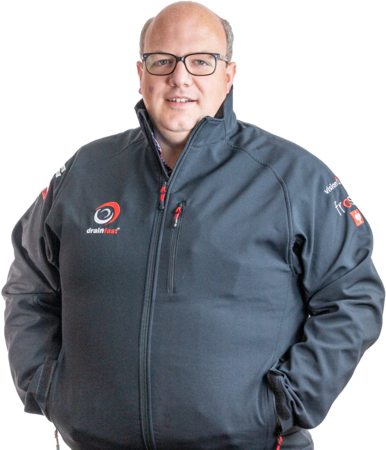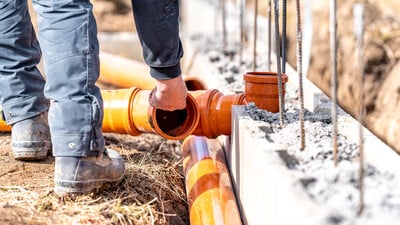A soil pipe system is the network of pipes that carries waste from toilets, urinals and bidets to the main drain, or to a septic tank or sewage treatment plant if the property has no main sewer connection. It’s important to not confuse this with the waste pipe system: we have written a helpful article that explains the differences.
Before the development and widespread use of plastic, soil pipe systems were generally made from cast iron, but today they are largely manufactured in PVC plastic. The connectors and pipe lengths of PVC soil pipe systems are joined either by a push-fit connection or a plastic weld. In this article, we will look at both alternatives, comparing their benefits and disadvantages.
Push-fit soil pipe systems
A push-fit soil pipe system features pipe lengths with one end ‘socketed’ (with the internal diameter slightly larger than the external diameter of the pipe) and the other end chamfered. Inside the socketed end, a rubber ring creates a watertight seal with the chamfered end of the next pipe as it inserted, with silicone lubricant being applied to the rubber seal and the chamfer to allow easy push-fit connection.
Fittings such as elbows also feature sockets with rubber seal rings and are connected in the same way.
Solvent-weld soil pipe systems
The couplers and fittings for a solvent-weld soil pipe system are also socketed, but the pipe lengths are plain at both ends. To connect a solvent-weld soil pipe system, solvent cement is applied externally to the end of the pipe and inside the connecting socket of the coupler or fitting. The pipe is then inserted into the socket and the solvent cement causes a chemical reaction that permanently welds the two together. If done correctly, this gas and watertight weld effectively transforms the system into a single unit.
Which soil pipe system is best: push-fit or solvent-weld?
In many respects, both systems are similar. They are manufactured to the same standards, are equally resistant to moderately high temperatures and inorganic acids, and are both suitable for outdoor and underground installation. Both options will give strength, durability and reliability.
However, there are differences and these explain why both are popular for different reasons.
Push-fit soil pipe systems: the pros and cons
Push-fit pipe systems have the advantage of being quicker and easier to connect; once the couplers and fittings have been selected, the pipe has been cut to the correct lengths and the cut ends have been manually chamfered to assist the fit, silicone lubricant is applied and a firm push connects the components. As soon as the system has been fully assembled it is ready for use.
The disadvantage of a push-fit soil pipe system is that can be prone to leaks, either because it hasn’t been assembled correctly or the rubber seal rings have deteriorated over time. Still, its semi-permanent connections allow the affected part of the system to be easily dismantled and repaired.
Push-fit soil pipe systems tend to be used more frequently for domestic plumbing and particularly for DIY projects as they are cheaper, easier and quicker. They also don’t carry the environmental and health risks associated with solvent cement.
Solvent-weld soil pipe systems; the pros and cons
The main advantage of a solvent-weld soil pipe system is that its connections are permanent. This means they are unlikely to work loose, leak or deteriorate over time. however, this is also its main disadvantage: once this has happened, dismantling is hard (if not impossible) should a bad weld start to leak or changes need to be made to the system’s configuration.
Other disadvantages are that it costs more, takes more skill and time to assemble, and must be left for 24 hours before testing or using the system to allow the solvent cement to cure and harden.
Solvent-weld soil pipe systems are more commonly used in commercial and public sector applications, where the additional strength of the joins makes them more resistant to impacts and professional plumbers rather than DIY enthusiasts will be carrying out the installation.
We hope you have found this information helpful and interesting. As always, we recommend a professional plumber is used to carry out this kind of work, but if you have confidence in your DIY skills and have any further questions you are always welcome to call our friendly team of experts on 01420 555600 or email [email protected].
Also, look out for more articles in our ongoing series of blog posts, bringing you useful information, insights, guides and tips on all things drainage!

Written by
Bob Stone
Technical Sales
Heading up our Technical Estimating Department, Bob is our in-house quantity surveyor.

